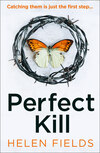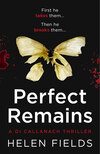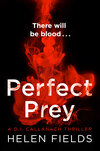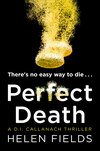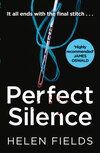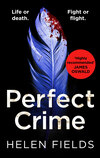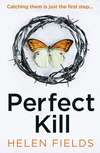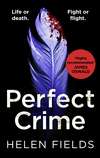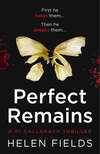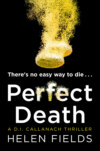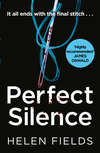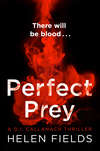Kitabı oku: «A DI Callanach Thriller», sayfa 4
Chapter Six
A building site just off Rue Curial, at the side of a hotel whose star rating Callanach estimated to be in the negatives, was where Malcolm Reilly’s body had been dumped, and it was about as far from the image of romantic, starlit Paris as it was possible to get. No building work had taken place there for several weeks while the builders settled disputes over safety regulations, so Malcolm had lain face down, between a cement mixer and a cherry picker, until some unfortunate labourer, who couldn’t possibly have been paid enough to have discovered a hollowed-out body, had turned up on a routine safety-hazard walk-around one day, only to have the site immediately closed down again as a crime scene.
Callanach looked around. There was some regeneration happening in the area, but he guessed that was only because land in that district was so cheap. Low-cost modern flats rose above lock-ups that harboured decades-old secrets. Cracks in walls were papered over with plaster, and alleyways led into dark places that no sensible person would enter. This was not the Paris of tourist fantasies. It was a world riddled with debt and a multitude of illegal ways to pay it off. This was a space where a body could rot and no one would notice, or care if they did.
A tarpaulin shielded the patch where Malcolm’s body had lain. Beneath it, a brown stain marked the concrete and brick rubble.
‘Was he naked when he was found?’ Callanach asked Jean-Paul.
‘Wrapped in a plastic sheet. We’re assuming he was left here at night to avoid witnesses. He was there for several days before the corpse was found. Did you speak to your boss about getting his medical records?’
‘It’s in hand. So how did they get access to the building site?’
‘They forced open two sections of wooden panelling and walked in. Dragged the body across the site – there was a build-up of rubble around the plastic sheet – left him, then put the panel back in place. We know from the construction company that building work was behind schedule though. It’s possible they’d planned to dump him in a foundation pit ready to be cemented over, but their timing was off.’
‘Fingerprints on the sheet?’
‘None. All the DNA belongs to the victim. The only unusual chemical identified was lanolin, and that was in quantities found only by swabbing the sheet. Not large patches or smears. Nothing visible to the naked eye.’
‘Lanolin’s from sheep’s wool, right?’ Callanach asked.
‘Yes. We’re compiling a list of possible sources – farms, animal movement vehicles, textile factories.’
Callanach looked upwards, checking which buildings had aspects that overlooked the building site. ‘And all these properties have been canvassed to check if they saw anything suspicious?’
‘As much as we could. We’d have needed twenty different interpreters to get round every apartment. You know what it’s like here. The police are the enemy.’
‘These people don’t want dead bodies in their back yard any more than anyone else,’ Callanach said.
A brick whistled past Callanach’s head and smashed at his feet. He leapt away and dived towards a cherry picker for cover as another hit Jean-Paul on the knee. Clutching his leg, Jean-Paul limped towards a half-built wall, crouching down with his back to the brickwork as a broken metal pipe smashed into an abandoned paint can.
The projectiles were flying at them from behind the main entry gates, and the aim was accurate enough that whoever was throwing had a decent view of them.
‘Get their attention,’ Callanach shouted to Jean-Paul.
‘Just stay where you are. I’m calling for police backup.’ Jean-Paul waved him back into the sheltered area.
‘Don’t do that. As soon as they hear sirens, they’ll scatter. Just divert their attention for a minute,’ Callanach said, ducking low and running towards the far end of the site where pallets had been stacked precariously high near the boundary.
Jean-Paul took a few steps away from the wall, shielding his head with one arm as he bent to pick up the broken pipe, then swung it high in the air and back over the fence from the direction it had come.
There was a cry, followed by a furious yell. As Callanach allowed himself a glance over his shoulder, multiple projectiles appeared over the top of the fence. He hoisted himself up on the nearest pile of pallets hoping they’d been stacked carefully, disliking the wobble as he rose higher. Jean-Paul yelled. Callanach turned to check he was unharmed. His foot slipped, the pallets groaning beneath his weight, and he grabbed at the stack to his side. Splinters slid diagonally into his right palm.
‘Fuck,’ he muttered, seeing Jean-Paul using a stray sheet of corrugated iron as an anti-assault umbrella. He smiled in spite of the pain in his hand and his concern for Jean-Paul. It was such a throwback to years gone by. He and Jean-Paul had travelled the world assisting police forces from other countries to track drug cartels, arms dealers and money launderers, and situations like these had been the days they’d looked forward to. Just enough physical jeopardy to get their pulses racing with the unshakeable belief that a few hours later they’d be sitting in some bar, empty beer bottles spread like trophies, and another credit on their Interpol files. Simpler times.
He hauled himself upwards, the splinters folding beneath his skin as he closed his fist, knowing he was facing a lengthy session with a needle and antiseptic later that night. The top of the fence was too thin to do anything except angle his foot onto its side to give him the boost he needed to jump. He took a literal leap of faith, hoping there wasn’t too much smashed glass or jagged metal on the other side. Landing well initially, he stumbled over a half-buried paving stone, falling sideways to avoid planting his splintered hand in the dirt. He opened his eyes to stare into the empty barrel of a syringe, the needle encrusted with blackened blood and pointing in the direction he needed to be going.
Getting to his feet carefully – avoiding the needle that he could see and what he presumed were several others better hidden – Callanach rounded the edge of the fence and sprinted for the far corner. There he paused, putting his mobile in camera mode and exposing it beyond the edge of the fence, filming as he assessed the situation.
Between eight and twelve young men packed into a tight group were picking up whatever they could find at their feet and lobbing it over the wooden security fence. Two others were standing with eyes pressed up to the gaps in the vertical planks, yelling instructions to the others. Middle Eastern in appearance and speaking rapidly in a language Callanach couldn’t understand, they looked more like bored teenagers than a serious threat, except for one who was keeping his distance, watching the others, making the odd comment. Callanach focused his camera as tightly as he could on the faces, hoping the sound recording wasn’t too muffled, as he decided what to do. These were local boys, that much was clear. It was a fair bet they realised he and Jean-Paul were police officers.
Calling for backup was the only way to ensure controlling the youths until each could be spoken to individually, but it was hard to achieve a completely silent police approach anywhere in Paris with tail-to-tail traffic. He wondered how much longer Jean-Paul could remain unhurt with so many projectiles raining down.
A gunshot stopped his strategising. The boy who’d been keeping out of the fray had apparently grown tired of the situation, aiming directly at the wooden fence and sending shrapnel flying at his mates. They leapt away shouting as the man-boy walked forward, gun out in front, towards the hole he’d created. Callanach knew that Jean-Paul would be calling the situation in and searching for better cover. More of a problem now would be stopping the inevitable move of the gang towards the entrance Jean-Paul and he had used, thereby preventing a safe exit. He and Jean-Paul were both unarmed. Interpol agents rarely took guns out during investigations unless there was a known or specific threat. Today was supposed to be about information gathering, not engaging in an anti-police showdown. Worse than that was the prospect that a stray shot might hit an innocent passerby. There was only one thing left to do.
‘Police!’ Callanach shouted. ‘Put down your weapons. Hands up and get on your knees.’
The shot came in his direction before he saw the young man move, glancing the corner of the fence and pinging away at an angle. Callanach ducked. Feet were pounding concrete but the high rise of flats in a square around them created an echo chamber. There was no way of knowing if the gang was running towards him or away. Callanach bolted for a nearby doorway.
There were shouts from just beyond his line of vision, frantic fury mixed with questions and instructions. Callanach forced his body back further into the recess. Footsteps indicated an approach in his direction, and he readied himself to fight.
Sirens sounded in the distance just as he was about to throw himself out of his hiding place. There was an instantaneous hush – everyone listening, trying to assess the direction from which the emergency services were coming. Then the scatter began. People running in all directions, calling to one another, their panicked voices revealing their immaturity. Less aggression, more uncertainty.
Callanach stuck his head out and watched them go. They ran at extraordinary speed, jumping railings, disappearing across the road, one leaping from a garbage can to grab a second-floor railing and haul himself up onto the exterior corridor of flats. Only one voice remained, calling, listening in silence, calling again.
‘Huznia.’ A pause. ‘Huznia!’
Callanach looked around. The caller was nowhere to be seen and his voice was fading. The sirens were getting closer, closing in from both ends of the road.
‘Huznia!’ The shout was more insistent.
A scraping noise came from behind a pile of bin bags. Callanach crept over to take a look as Jean-Paul appeared from the far end of the building site sporting a large graze across his cheek. He gave a thumbs-up. Callanach responded with a nod and a finger over his lips to keep him quiet.
Covering the final distance to the bin bags quickly, Callanach found a young girl crouched, tears in her eyes, looking absolutely terrified. He smiled at her gently, hands slightly raised in the international signal that no harm was intended. She looked less than convinced.
He spoke in French to her, quietly, slowly and clearly. ‘Everything’s all right. Do you speak French?’
There was a brief pause then, ‘Yes,’ with a sob.
‘Are you Huznia?’
She looked surprised, then relieved – nodding – young enough to believe that anyone who knew her name must be friend rather than foe. Callanach wished life was really so black and white.
He smiled gently. ‘My name is Luc. Don’t be scared. Who are you waiting for?’
‘My brother,’ she said, looking away to the side. Her French was good considering her age – he guessed she was five or six years old – but then desperation was often the most compelling teacher of foreign languages.
‘Who’s your brother?’ Callanach asked.
‘Azzat,’ she said quietly. ‘Do you know him?’
‘I think he’s looking for you. Are you hungry, Huznia?’ Callanach asked, lowering himself to one knee to get closer to her.
She frowned. Good girl, Callanach thought. At least she’d been taught to be wary of strangers.
A pair of boots appeared in his peripheral vision, scruffy, a hole in front of the big toe of one. Callanach took his time turning round to assess their owner. The boy was in his mid-teens, but his eyes were older. He was ready to fight, ready to run, ready to do whatever he had to. His clothes were in the same state as his boots, ragged and ill-fitting. Stolen or hand-me-downs. His face and hands were bruised, and darkened with the sort of dirt you couldn’t really shift without soap. He and his sister were obviously living rough.
‘Leave her alone,’ the boy said. His French was fluent, not just the words but the accent, impressive for a second language.
‘I’m not going to hurt your sister,’ Callanach told him. ‘I’m not here for you, but I have some questions about the body that was left at the building site. Do you know about that?’
‘Huznia, come to me,’ he said.
Callanach took a few notes from his pocket and held them where the little girl could see them.
‘Your sister’s hungry,’ Callanach said. ‘And she needs new clothes. I just want some information.’
‘We don’t need your money,’ Azzat said. ‘We’re fine. Now get out of the way and let my sister get by.’
‘I’m not going to stop her from getting to you. You have nothing to fear from me. We’re just talking.’
A police car roared into view. Azzat pushed forward, grabbed his sister by the arm and began pulling her out from between bin bags.
‘But I am hungry!’ she whined.
‘I’ll get you food,’ Azzat said.
Callanach stepped aside to let them get past him. ‘Where are you from originally?’ he asked.
‘Afghanistan,’ Huznia said. ‘Do you have food in your pockets?’
Callanach passed her a twenty-euro note, keeping another in his hand but on show. Other police officers were approaching cautiously.
‘Do you live near here?’ The two children stared at one another. ‘All right. You don’t have to tell me. Take my card, though. Keep it. I need to find out who brought the body that was found in this building site. Call me if you know anything. Maybe I can help you.’
‘You’ll take my sister away from me!’
‘Will he?’ Huznia cried.
‘No, I won’t. And I won’t let anyone else either. I can see how much you love each other.’ Callanach held a hand up to the approaching officers, keeping them at bay some twenty metres away. ‘Take this money, buy some food and make sure you have somewhere safe to stay. If you get in trouble, call me.’
Azzat snatched away the cash and the card, shoving them in his pocket as he and his sister began to run.
‘Huznia, don’t let him throw my card away,’ Callanach shouted after them.
The girl looked back, gave a half wave, then they were gone down an alley that was no more than a crack between buildings.
Callanach supposed he should have called family services and had them taken to a children’s shelter. There was obviously no adult caring for them. They were skinny and unkempt. But there was every chance they’d be separated. It was difficult housing a young girl with a teenage boy. The psychological damage done by separating dependent siblings was enormous. They would get lost inside a system that did its best, but which too often left children sitting in the dirt at the bottom of life’s slide. The truth was that maybe they were happier living rough, but together.
‘Why didn’t you bring him in?’ Jean-Paul demanded from behind him. Callanach turned round. His colleague was holding a gauze pad to a bleeding wound on his head, and looking shaken.
‘He wouldn’t have told us anything,’ Callanach replied.
‘He might have, if he’d thought the alternative was having his sister taken away,’ Jean-Paul said, tossing the gauze into a skip and setting his free hands on his hips.
‘I wasn’t prepared to do that.’
‘Yeah, well lucky for you, you’re not the person who’s going to have to explain to Malcolm Reilly’s parents how he died. Did you go soft in Scotland?’
‘Maybe I just grew up a bit,’ Callanach said quietly, wondering where Ava was at that moment, part of him wishing he could have been with her to give the news to Malcolm Reilly’s family, and the other part equally glad he wasn’t.
Chapter Seven
Bart woke up feeling sick, rolling dramatically to his left and smashing his face against the wall. Metal screeched and the world shifted around him, tilting forwards then back, until he lurched for the ring in the centre of the floor and held tight. The feeling of movement wasn’t new. His world had been unstable since he’d first awoken, but this was something different. Almost – although he told himself it was the lack of fresh water and decent food making him delusional – like flying.
The box he was trapped in shifted again, and this time there was a different noise. Whistling, a gust, then a spinning turn. He gripped his stomach, wishing it would stop. It was a desperate thing to have become resigned to dying alone in what amounted to little more than a cell. The air stank from the bucket he’d had no choice but to fill, avoiding the overflow where it had tipped twice during the journey. Despite turning off the electric lamp for increasingly lengthy periods whenever his sanity could stand it, the battery was fading now. Alone in the dark, cold and starving, at least fear had deserted him too. There was nothing with him in the dark that could hurt him more than his own imagination, and he had conquered that. For the briefest of periods he had managed to meditate, sitting upright, blanket wrapped around his stiff body, breathing in a rhythm with his heartbeat, imagining sitting on a beach at sunset, listening to the waves. Just the waves. Letting nothing else in. It was a neat trick when you learned to do it well. Having an ex-girlfriend who’d been training to become a yoga instructor had helped. The effects just didn’t last very long.
His ribcage protested as a huge crash beneath his prone body reverberated through him. Bart realised the sensation of flying hadn’t been a product of his nutritionally starved mind. Whatever container he was in had been moving through the air. No more, though. All movement, the sense of rocking, had ceased. New noises invaded his space, muffled and distant, but there were definitely voices blended in with the mechanical din beyond his walls.
Bart stood up, listened, strode towards a wall and took a deep breath. Hammering on the wall he began to shout. He bolstered the noise of his fists with one foot. When that was bloody and raw, he used a knee instead. Nothing. No response. Letting his fists rest – by now his hands resembled a cage fighter’s – he took the strain with his forehead. Unfamiliar with the art of giving a Glaswegian kiss, Bart didn’t let himself be deterred. He headbutted the wall as if his life depended on it, mainly because by then he’d realised that it did. He would die inside that box if something didn’t happen soon. Slamming his forehead into the wall three, four, five times, he went reeling backwards, losing his balance and ending up back on the floor. On his knees, he went for the wall again. The electric lantern finally gave up the ghost. In the perfect dark he hammered, shouting, yelling, screaming, until his voice was nothing more than a whisper. Then an engine started up and everything started moving again. Bart lay down and let defeat shrivel him into submission.
It was impossible to know how long the journey had taken. Bart had either slept or passed out. His head was thumping and there was blood crusted on his forehead and down his cheeks. The memory was vague, but at some point his body had assumed control of his brain and apparently tried to break through the walls. He was paying for it now. Bart tried to stand and failed.
From the far end of his prison box came the squeal of metal then something else, and for a moment he couldn’t identify the change. The quality of the blackness changed. Not dramatically. No one switched on a light, but there was a new duskiness to the dark, shifting from black to the deepest of greys. Particles of light were invading his atmosphere. He’d assumed the space was completely sealed. Not so. Crawling on hands and knees, he made for the wall closest to the noise.
‘Open it up,’ a man shouted. Someone answered with an accent Bart recognised as French even if he couldn’t speak the language.
He stared at the walls, as if by concentrating hard enough he would be able to see the faces that lay beyond. Were these his rescuers? His assailants? Raising one bruised and shaking hand, he paused before knocking. He had no idea how long he’d been trapped inside – days, he assumed – but already his prison felt safer than the unknown beyond. In the outside world he’d been kidnapped and removed from everything and everyone he loved. He had no idea why or by whom. He’d never expected to fall victim to such evil. Now it was all he could think about. Every face he saw would be a mask, every word a lie. He would never be able to trust anyone again.
A scraping-crunching came from one upper corner of the cell before Bart found his courage. He backed away. The first clear light pierced the gloom to reveal a scene that had him cringing with embarrassment in spite of the horrors he’d endured. A blast of fresh air only served to intensify the stench of human waste that Bart had become used to, but now he could see it. The bucket he’d been using had overflowed with the journey and the floor was awash. He held his filthy hands in front of his face. Now he could smell himself, too, and felt a desperate urge to vomit as the end of his prison was crowbarred away to the sound of ripping wood. Beyond the opening it was too bright for his eyes to focus.
‘Help me,’ he whispered.
‘Pick him up,’ a man said. Heavy boots crossed the wooden cell. Two men took an arm each in gloved hands, dragging him out into the daylight.
Bart breathed deeply, his eyes closed, feeling weak sunlight on his face and doing his best to muster some strength in his legs. His eyes were taking their time adjusting to the brightness. After a few steps, the men lowered him to the ground and he sank gratefully to his knees. An open bottle was thrust into his hands. He sniffed it, registered nothing but cold water, and swallowed the bottle in one go. A car park appeared in blurred patches. A few vans, gravel, brown grass around the edges, no buildings in sight – nothing that gave him any indication where he was. Behind him, on the back of a massive lorry, was a cargo container. He blinked, made an effort to keep down the water, and rubbed his sleeve over his eyes. Inside the container was a thick-walled wooden cell, the end wall prised off. A second bottle of water was handed to him.
‘Slowly,’ a man said. ‘Then eat.’ A loaf of bread in a tatty brown paper bag was thrown down to him. The tone and the treatment were all the confirmation needed of his status. His vision was clear now, as was his sense of smell. He stank. Not like he imagined a human who’d been incarcerated would, but like an animal. All filth and sweat, the sort of smell found in farms and abattoirs. The men around him seemed not to notice. They weren’t surprised by the state of him. Which meant they’d done it before.
He grabbed the bread, which looked like a gourmet offering compared to the box of stale snacks that had been left in the container for him. Even so, he’d consumed it all early in the journey and been left desperate for more. Once you realised what true hunger was, seizing food no matter what position you were in was more instinct than choice. As he ate, men wandered into his former home with buckets. The sound of sloshing water hit the floor and streams of filth ran out. Another brought several heavy-duty plastic cartons from the back of a van, with boxes of what must have been food supplies, similar to those he’d found.
‘I can’t go back in there,’ he told the man closest to him through a mouthful of bread. ‘Can’t do it.’
The man ignored him, and barked orders to others, tapping on his watch. Faster movement followed, guns were drawn and men approached the backs of two vans.
‘Head down,’ Bart was ordered. When his reaction time wasn’t fast enough, he was assisted with a slap to the back of his scalp.
He kept his head angled down, but his eyes up. The van doors opened slowly. The men reached in, pulling out the occupants of the vehicles. One by one, women appeared, hands tied, moving slowly, blinking at the sudden change in environment. Their faces were dirty and their clothes shabby, but they weren’t in the same dreadful state as Bart. Not yet, but then they were ushered towards the container. One woman began to cry, and it spread through them like a virus, the women either side succumbing to tears, another going straight into a wailing sound as if she had only been waiting for a prompt. Bart kept count. Four women from one van, five more from another. He hoped for their sakes that they were given several more buckets for the journey.
One woman fell to her knees, then let herself go to the floor face first, sobbing, begging in the universal language of terror and desperation. A guard gave her an order. She didn’t move. That earned her a kick. She reached out for the man’s ankle, grabbing it, pulling herself towards his feet. He leaned down, snatching a bunch of her already matted hair, wrenching her face upwards to look into his eyes. He spat, waved the gun in her face. She sobbed some more.
Bart wanted to say something. In the dim recesses of his mind he imagined a braver man, a stronger male specimen who had not been so broken by his ordeal, springing up, wrestling a gun from one of the men, shooting off a couple of bullets to show he meant business, before taking command of the situation and freeing them all. What he did was let his face fall to the dirt. What he didn’t see couldn’t hurt him. Instead, he heard all he needed. In spite of the constant mechanical noise of the previous days – he wasn’t quite sure of the time period – his ears were as alert as ever. He heard another kick, that soft whoosh of air as foot contacted stomach. More crying. Laughter. Another man’s footfall, heavy, slow, deliberate. Then the unmistakable sound of a zip being lowered. Liquid hitting skin in a constant stream. The woman let out a howl that was end-game hopelessness. The reduction to nothing more than disposable goods was complete. As Bart opened his eyes, the woman was crawling away through the dirt, following the others into the black hole that he’d just escaped. The men picked up the wooden end wall of the cell, took nails from their pockets, gathered hammers, and began to seal it up. The hammering from the outside was matched blow for blow by the sound of fists hitting the inside of the wood. Bart had time to wonder if the men had bothered to replace the batteries inside the lamp. As pathetic as it was, that tiny spark had been everything to him in the endless dark.
He looked past the man standing over him.
‘I need to pee,’ he said. ‘Where do I go?’ The bottles of water had run through him like fresh rain off dried mud.
The man pointed at the ground where Bart sat. He was going nowhere. If he needed to piss, it was right there or not at all. He did what he needed, watching as the enormous container door was swung shut. A wooden cell within a metal prison. Enough noise externally that no one would ever be heard within. He wished vaguely that he hadn’t bothered ripping his vocal chords to shreds for nothing. With one hand taking care of business, he used the other to dip into the rear pocket of his jeans, clutching his most treasured possession, loath to sacrifice it, but who knew where he might end up next? If this was his only chance to leave a note, a record of his passing, then he had no choice. He waited until all eyes were elsewhere, then dropped the photo of his father behind him in the dirt as he zipped up his jeans.
Ten minutes later and the container was gone, driven away on the back of a lorry by three of the men. Two others climbed into the unmarked white vans from which the women had disembarked, leaving one final van and a car. The women were obviously being trafficked, presumably for sexual exploitation or into slavery. What he had no understanding about whatsoever was why he was there. He figured he would find out soon enough, and the answer wasn’t going to be one he wanted to hear. So he just didn’t ask. He wondered what the men thought of him, on his knees between a puddle of his own urine and a stream of someone else’s, not even asking for his freedom. Not begging, not trying to run. Just doing nothing. His life had gone from hopes and dreams to a nightmare in such a short timeframe that his head was spinning with it. Just survive for the next five minutes, he thought. After that, I’ll worry about another five. If I make it to tonight, I’ll worry about the morning. The bread sat in a hard lump in his stomach. He would comply. There was no point annoying his captors. He would watch and learn. Information, he heard his father say inside his head. You can’t run if you don’t know where you’re running to. You can’t fight if you don’t know your enemy’s strengths. And you can’t do anything at all dehydrated and starving. Eat and drink whatever they offer, Bart told himself. Sleep when it’s safe. Don’t hope. Plan.
‘Car,’ one of the men said. ‘Now.’
Bart stood up and stretched.
‘More water?’ he asked.
The men looked at one another, until someone shrugged and reached into the van, throwing another bottle in Bart’s direction.
‘Piss in my car and I’ll cut your dick off,’ he was warned. ‘Turn round.’
He was marched to the boot of the car and told to climb in. The floor was covered in old blankets that smelled of dog. He was given a moment to take another drink before his hands were tied behind his back.
‘I hear you bang or shout, I pull over and fucking gut you. Get in.’
Bart did as he was told. The container lorry had headed north, as far as he could tell from the position of the sun and the fact that the day was still warm with some hours of sunlight to go. The car was pointed in the other direction. It was a straightforward exchange then. Made sense. Why pay for a container if it only held goods to trade in one direction? Two or three of the men had spoken French to each other. His journey, while it had seemed endless, could only have been a couple of days. France seemed like the logical point for them to have docked in that timescale. The women had spoken a language he hadn’t recognised though. A couple of them had been very dark-skinned, but the majority looked more Eastern European. Either they’d been kidnapped or they’d thought they had found a passport to a new and better life. That was almost crueller. Paying their captors for the prospect of safe passage and finding the opposite, their families left to wonder what had happened to them and why they’d never contacted them again.
